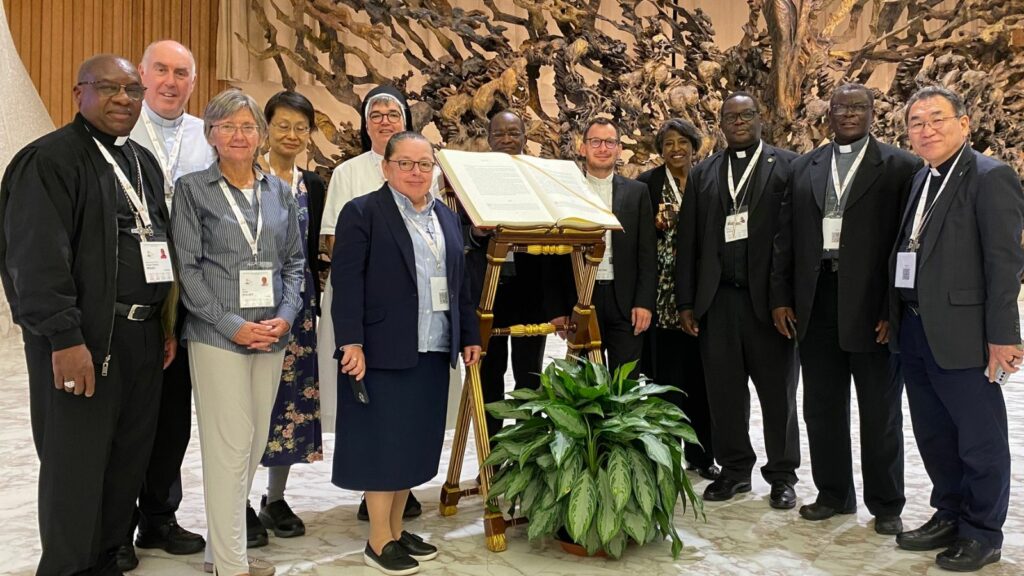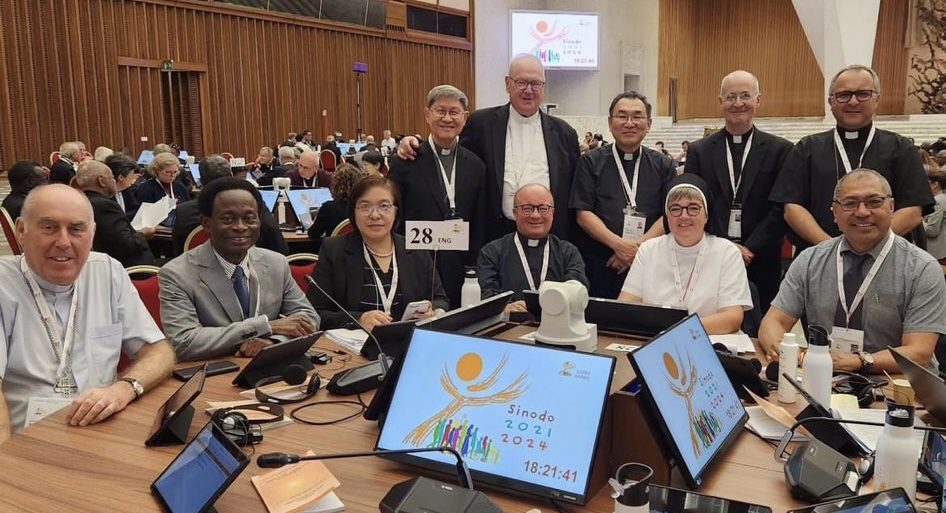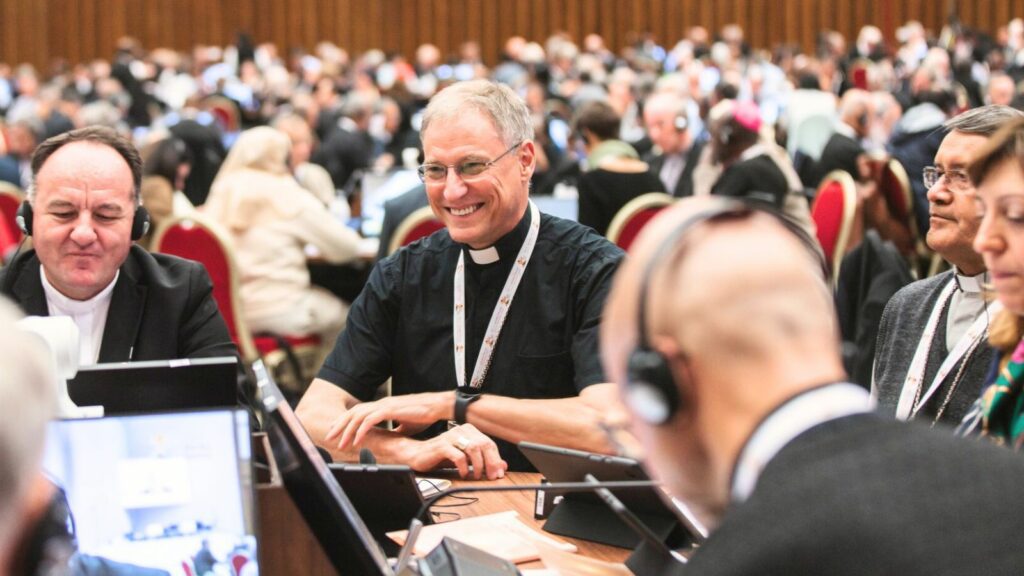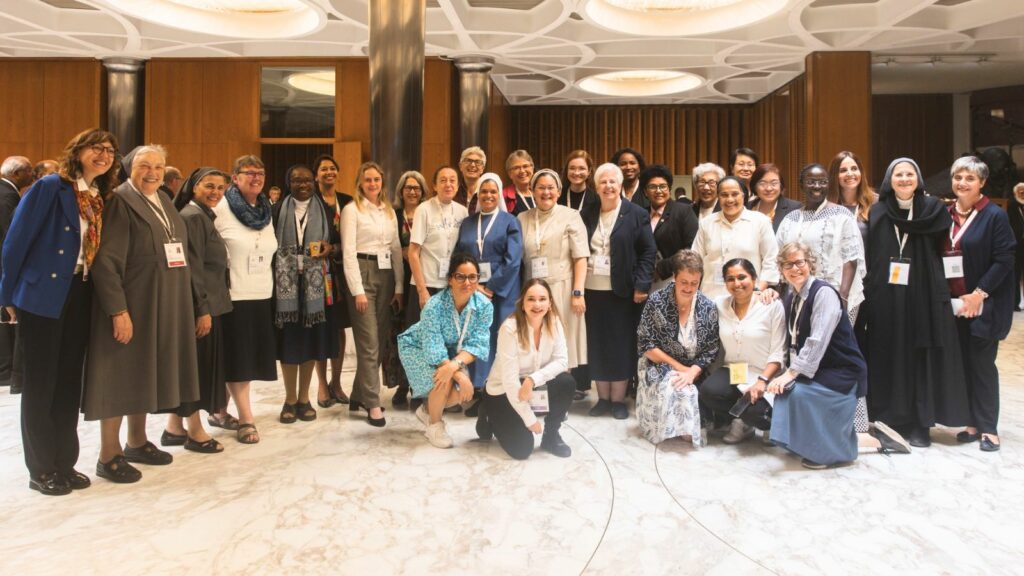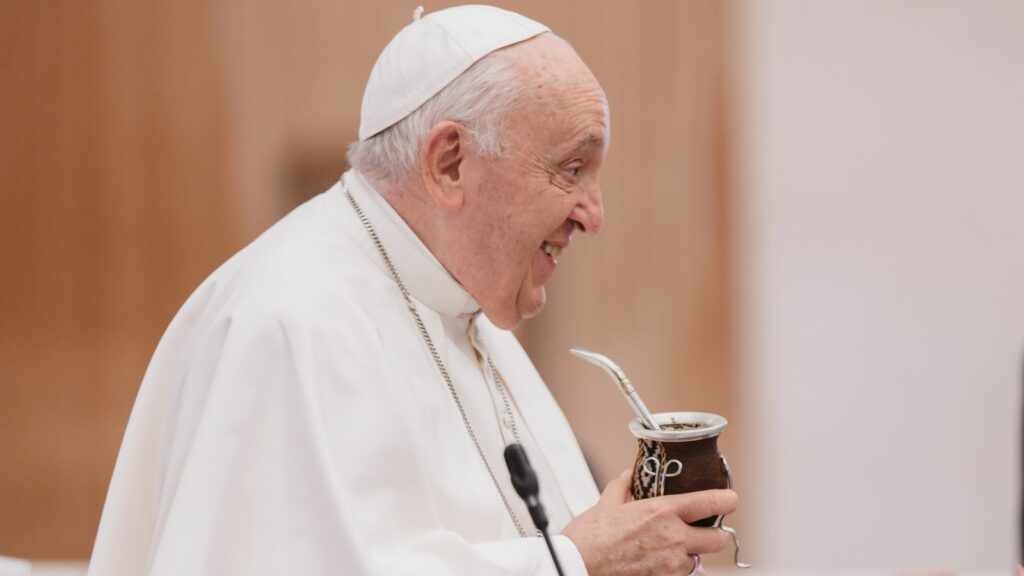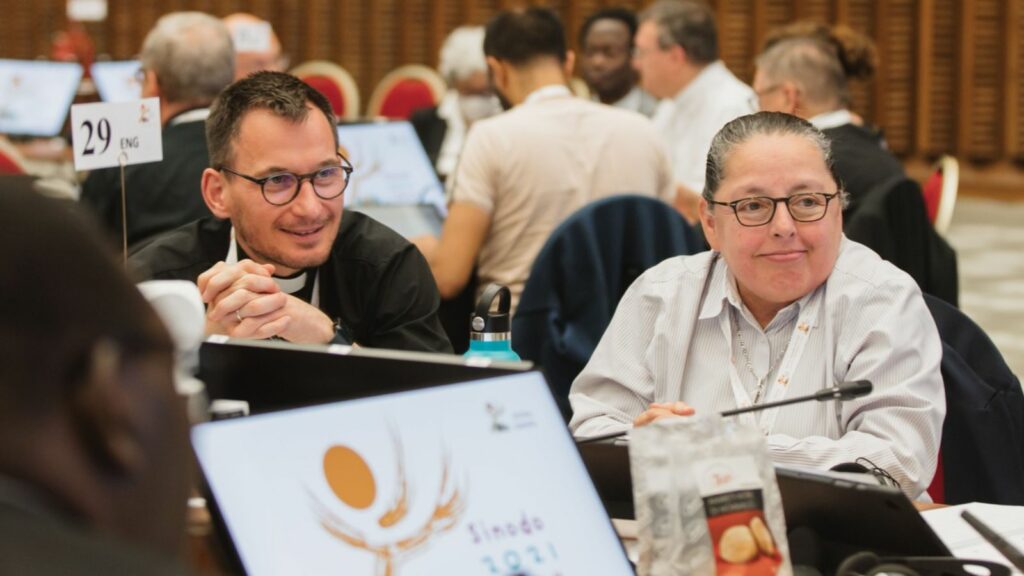Bishop Brian McGee is representing the Catholic Church in Scotland at the second session of the Synod of Bishops in Rome.
He has been posting updates on the Facebook page of the Diocese of Argyll & the Isles and we have put his posts here so you can read about the progress of the Synod.
Wednesday 23 October 2024
Any final amendments to the draft Final Report had to be submitted by 12.30pm today.
The theologians and writers are once again hard at work because the revised text must be ready for approval on Saturday.
My mind is increasingly turning to how synodality can be developed both in Argyll and the Isles and across Scotland.
After lunch I participated in a voluntary and helpful workshop called ‘Bringing Synodality Home’.
On Monday I spent an enjoyable hour walking through the Vatican Gardens. Without a doubt the combination of manicured gardens, plants, ancient statues, the Vatican buildings and the sense of history and faith is remarkable and beautiful but, to be honest, I still consider the raw grandeur of God’s creation found in Scotland’s mountains, lochs and islands to be even more beautiful still!
Tuesday 22 October 2024
The atmosphere has been terrific during this Second Assembly.
Last year we were strangers and initially unsure of the process and so it took a bit of time for us to settle in, although we did do so. 
This year has been completely different. The bonds of friendship and trust were immediately renewed.
We picked up where we left off and it has been wonderful sharing with people from almost every country in the world. We are very aware of the privilege and responsibility we have as Synodal delegates.
There is a determination to do our best.
There is a genuine openness to the Spirit.
The experience fills us with hope for the future of the Church.
Monday 21 October 2024
Our fifth module began today with a Day of Recollection.
We started with Mass of the Holy Spirit in St Peter’s Basilica, under the beautiful stain glass window of the Holy Spirit. I always find this an inspiring image, especially when we are seeking the Spirit’s guidance.
After a meditation delivered by Fr Timothy Radcliffe we were given the draft Final Report to read in silence.
I headed off to the Vatican Gardens which was a beautiful setting for pondering the text in silence.
The afternoon consisted of Conversation in the Spirit within our Small Group. Tomorrow we begin discussing the text and proposing changes.
Sunday 20 October 2024
On the night before the Synod began I prayed at the tomb of St Catherine of Siena seeking her intercession.
Rome is full of tombs and Churches dedicated to saints: Our Lady, St Peter, St Paul, St Monica, St Charles Borromeo, St Ignatius of Loyola, St Philip Neri, Popes John XXIII, Paul VI and John Paul II and many others.
During weekends I have visited many Churches to seek the intercession of these and other saints buried or dedicated there. Why? The Communion of Saints.
The saints are part of the Church but are now sharing in the glory of Christ in heaven.
They have clarity regarding what life is about and they love us, therefore they want to intercede on our behalf.
I am aware of the importance of this Synod and my own limitations and therefore it seems natural to me to seek the intercession of my brothers and sisters in heaven.
Furthermore, this Synod does not exist in isolation but is part of a long history of many gatherings of Councils and Synods.
It is important to remember that what we are doing is not something novel or in isolation but rather part of a long tradition to which I know we must be faithful.
For that too I seek the intercession of the saints who were disciples that discerned and followed God’s will, including those who participated in previous Synods and Councils over the past 2,000 years.
All you Saints of God, pray for us.
Saturday 19 October
Yesterday we finished the fourth module which also marks the end of our (chocolate munching) Group.
The theologians and writers have, of course, already been hard at work and now they must finish the draft Final Report over the weekend.
They have to bring together a potential 1,650 submissions from groups and individuals in five different languages from numerous cultures across the world. Not an easy task!
However, it is important work as the Report, once approved, will be presented to Pope Francis. The Report should accurately reflect the Assembly’s discussions but also contain concrete proposals for how the Church can become more synodal and missionary.
Please keep the writers in your prayers over the weekend.
Our fifth and final module begins on Monday with Mass in St Peter’s at 7.30am which will be live-streamed on
Vatican Media.
Friday 18 October 2024
I mentioned at the beginning of October that Pope Francis had established 10 Working Groups to study recommendations which were raised during the First Assembly but needed further theological or canonical research.
Today we have an opportunity to meet with the Working Groups, which will report back to Pope Francis by the end of June 2025.
The 10 Groups are studying: (i) Ecumenism (ii) Cry of the Poor (iii) Relations between Eastern Catholic and Latin Churches (iv) Relationship between charismatic and hierarchical ministries, including the role of women (v) Bishops, including a synodal method of selection (vi) Relationship between bishop, religious and ecclesial movements (vii) Formation in synodality(viii) How does love and truth relate? - working synodally in difficult dogmatic, pastoral and moral issues (ix) Digital Mission (x) Nuncios.
Two further Groups are studying Canon Law and polygamy (pastoral care where traditionally practiced).
If you wish, you can also share your own thoughts with one or more of the Working Groups by emailing synodus@synod.va
Interestingly, myself and the Superior General of Female Religious, Sr Mary Barron, both received a document from an Argyll and the Isles parishioner which had arisen from one of our parish’s recent Led by the Spirit Meeting, which has now been passed to the relevant Group.
Thursday 17 October 2024
In response to a request made during last year’s Assembly, deeper theological reflections have been provided on key synodal themes. These Forums are held on Wednesday evenings and open to anyone.
A panel of experts speak on different aspects of a particular topic before taking questions from the floor.
The topics have been:
(i) The People of God and mission
(ii) Bishops in a Synodal Church
(iii) the relationship between the Local Church and Universal Church and
(iv) Papal Primacy and the Synod of Bishops.
Wednesday 16 October 2024
To keep our Small Group’s energy levels up (and sugar levels too, unfortunately) we share chocolate during every session but today we were healthy with bananas!
For some strange reason, they want me to bring whisky!

We are half way through the 4th Module, reflecting on ‘Places’ of synodal missionary activity: how can parishes, new movements, basic Christian communities, cultures, digital technology, migration, dioceses, Bishops’ Conferences, the Roman Curia, the Pope, plurality yet Unity of Faith etc help us become more missionary?
What are the obstacles, what needs to change, what must develop, in a radically changing world, for us to become more relevant and effective missionaries?
Tuesday 15 October 2024
The Synod logo and message (For a Synodal church: communion, participation, mission) remains the same but the language constantly changes on our monitors. Now it is in Arabic.
This visualises the richness of encounter here, as we listen to people from all across the world - and not restricted to the official meetings but over coffee, in our residences and during worship.
As we reflect on Church life and how the Lord is leading us to deepen our mission such encounters are eye opening and encouraging.
The Spirit is at work and people are responding from every tribe, race and nation! We are truly blessed to be here and I hope that I can share some of that with you when I return home. Mass will be celebrated tomorrow, Wednesday, at 3pm and will be broadcast on Vatican Media.
Monday 14 October 2024
The past two Sundays I visited the Scots College celebrating Mass and enjoying their hospitality over lunch.
It was good to spend time with our seminarians and staff. I thank the Community for their generosity in discerning the Lord’s call for them. Please remember them in your prayers. 
Yesterday I travelled to the College with Sr Catherine Skelton, a Daughter of St Paul, who is now based in Rome. We both grew up in Joseph’s Parish, Greenock - in fact on the same street, Grieve Road. I asked Sr Catherine why she joined her particular Congregation.
As a teenager on holiday in Rothesay she attended Mass in St Andrew’s and picked up a book about St Paul’s founder and from that became aware of her vocation! Tourists are constantly visiting parishes across our diocese.
We have a privileged ministry and we should never underestimate the positive influence the Lord can have through us.
Sunday 13 October 2024
I know that it’s hard to believe but yesterday I received pictures from a hailstone drenched Greenock so greetings today from a warm and sunny Rome!
We are now half way through the Synod. Tomorrow we will complete our third module, entitled Pathways for Synodality. Previously we recognised that the richness of relationships which makes up the Church is both powerful and fragile.
Now we are reflecting on the ways decision taking and decision making can be consistent with synodality. Topics have included formation, discernment, the manner decisions are taken, transparency and evaluation.
There are many nuances in these and other relevant areas and so we have been delving deeply in order to offer concrete proposals to Pope Francis.
Saturday 12 October 2024
We participated in an Ecumenical Service yesterday evening in the grounds of St Peter’s at the shrine to the First Martyrs of Rome, on the 62nd anniversary of the beginning of the Second Vatican Council. 
The desire for Christian Unity was reinvigorated at the Council while the Synod of Bishops is one of its many fruits.
There are 16 Fraternal Delegates participating in the Synod from Orthodox and Protestant Churches. Although Fraternal Delegates cannot vote they fully contribute to our discussions, both in the Small Groups and Plenary Sessions, and their insights and friendships enrich us.
The entire synodal journey has emphasised the importance of baptism which has ecumenical implications since all Christians share a common baptism.
Friday 11 October 2024
The Catholic Church consists of 24 Churches of which by far the largest is the Latin Church.
The other 23 are knowns as Oriental or Eastern Catholic Churches which are in full communion with the Pope, although they celebrate Mass and worship in different Rites and have distinct traditions from us in the Latin Church.
The Eastern Catholic Churches are traditionally found in the Middle East, Eastern Europe, Eastern Africa and India although many members now live in the West due to war, persecution and poverty. In fact, it is quite possible that recently some have moved into your own parish and will be attending Mass alongside you in our Latin Rite.
However, when possible they will attend Mass in their own particular Rite if one of their priests is available and their numbers are sufficient. We should make every effort to welcome them into our parishes but also support them in preserving their bonds with their own particular Eastern Catholic Church.
The Oriental Churches are participating in the Synod and our unity in diversity witnesses to the catholicity of our Church.
During the week we celebrated Mass in St Peter’s according to the Maronite Rite. The Maronite Church is mainly found in Lebanon and we prayed for the people of Lebanon who, of course, are suffering from war.
Last Monday Pope Francis called for a day of prayer and fasting for peace. On Monday the Synod members held a collection for the parishioners of the only Catholic parish in Gaza.
Many families are sheltering at the Church complex in terrible conditions and Pope Francis phones them every day. The Collection raised just over 32,000 euros which has already been sent to the Holy Land.
Thursday 10 October 2024
I explained yesterday that proposals from each of the 39 Small Groups are fed into 5 language groups, populated by the rapporteur from each Small Group, which in turn decides which topics seem the most important.
One (poor) rapporteur is voted by each language groups to represent them in a further meeting, with the General Secretariat, to make the final decision about the topics, now formulated as questions, which best represent the thoughts of the 370 Synod members.
Not an easy task! 7 or 8 questions are then emailed to each member to mull over.
Next day every member votes for what he or she thinks is the most important question to discuss. 
We are then told the order of preferences. During the Plenary Assembly the top 4 questions will be discussed, beginning with the question which received the most votes.
This question will also have the most time allocated with the second question following but with a bit less time and so on. The final period is for free interventions on topics which did not make ‘the cut’. Members can speak for 3 minutes with silence after every 4 speakers.
After the third Plenary the Small Group again meets to discuss what they have learnt from listening to the entire assembly.
We then pen our written report, maximum of 2 pages, which must contain concrete proposals, vote that it is an accurate record and then the rapporteur submits it to the General Secretariat.
We then lie down in a quiet, dark room before beginning the whole process again for the next module!
Meanwhile the theologians and writers begin reading our submissions to pull themes together in preparation for drafting the Final Report.
Tomorrow, Friday, there will be an Ecumenical Service at 6pm which can be watched live on Vatican Media.
Wednesday 9 October 2024
It was my birthday yesterday which I had hoped to keep quiet but the Synod Secretariat think that it is ‘nice’ to publicly announce these things.
My Small Group then hurriedly printed an impromptu Birthday Card (with all our faces on it) and got/stole a wee cake.
Perhaps this was to make up for having voted me as the rapporteur the day previously (they obviously didn’t get the memo about my near disaster as Secretary in my previous Group).
Last year the Small Groups were given different aspects of the same topic to discuss and so the feedback to the Plenary was varied. 
However, this year we are all reflecting on the same chapter from the Working Document.
To avoid unnecessary repetition during the Plenary Session there are only 5 feedbacks, representing all the 39 Small Groups. How is this achieved?
Yesterday I explained that the Small Groups, after 4 rounds of sharing, agree on particular topics they would like the Plenary Assembly to discuss in greater detail.
Each Small Group elects a rapporteur who will represent it and present their preferred topics when the 39 rapporteurs meet over 5 language groups: 2 English and 1 each of Italian, French and Spanish/Portuguese. For 2 hours the rapporteurs prayerfully share their individual groups conclusions, then agree together which are the most important topics before formulating questions which will be proposed for the Plenary Session.
Tomorrow I’ll explain the next steps in a very thorough discernment process.
Tuesday 8 October 2024
During the Synod our discernment is based on the Conversation in the Spirit method, which discerns God’s will by listening to the Spirit through the Scriptures and each other, who are temples of the Spirit. The atmosphere is one of prayerful reflection.
Our text is the Working Document (or Instrumentum laboris) which is the fruit of three years discernment across the Church. Our task is to deepen its strengths and correct its weaknesses and thereby ultimately present to Pope Francis practical proposals for making the Church more synodal. 
The Working Document consists of four chapters, each exploring a particular topic. There are 39 Small Groups, arranged linguistically, consisting of around 10 members plus a facilitator.
In advance we prayerfully read the relevant chapter. After silent prayer each member shares the chapter’s strengths for 3 minutes. Everyone listens without interruption. More silence before we share what needs further development, inclusion or omission, again without interruption.
Thirdly, after silence, we share what touched us when we listened to others - what attracted or challenged us. We then have an open discussion before agreeing which topics we want the whole Assembly to explore more deeply. The next stages I will share with you tomorrow.
Monday 7 October 2024
This morning we joined our new Small Groups for the Second Module.
It’s almost like the first day at a new school, looking around to see who is there! Anyway this time I’m the only member living in the West so that should make for rich sharing and learning.
Last week’s module reflected on the foundations of Synodality including spirituality and theology. The next three modules should identify practical steps to ensure the implementation of synodal practices at every level of Church life - parishes, dioceses, nationally, lay movements, Religious Orders and universally.
So the emphasis is now firmly on HOW the Church can better live synodally.
This second module focusses on Relationships while the next two will be Pathways and then Places.
Relationships includes (but not restricted to) our relationship with God; the charisms and ministries among all the baptised; relations with each other e.g. bishops and priests, laity and clergy, among clergy, among parishioners, Religious, ecumenically, Inter-Faith and secular society.
The method we are using is Conversation in the Spirit, similar to last year but with some changes. Tomorrow I will explain how it works.
Sunday 6 October 2024
Today Pope Francis invited the Synod participants to join him in praying the Rosary for peace in St Mary Major Basilica.
The Holy Father has also asked that tomorrow, 7th October and the first anniversary of the Hamas attack on Israel with all the terrible suffering which has followed, be a day of prayer and fasting for peace.
Several participants in my Small Groups are from the Middle East and other troubled countries.
Listening to their and others’ experiences is moving and disturbing. I marvel at their courage in even being here.
Humanity is capable of so much good and beauty but also of dark depravity. Many conflicts are complex with long painful histories. Solutions may seem impossible but never for God.
Please join the Pope tomorrow in prayer and fasting for we all need hearts melted by Christ’s love that will work for peace, justice and reconciliation.
Our Lady, Queen of Peace, pray for us.
Saturday 5 October 2024
We finished our first module today.
As Secretary for our Small Group I was responsible for keeping notes and then writing our Report.
All went well, the Report was unanimously approved and everyone left except for the Rapporteur who was then to submit it.
Suddenly I couldn’t find the file on my computer and absolute panic set in! 
Thankfully the Rapporteur eventually discovered it and our Report was safely submitted.
I arrived home late for lunch but boy, did I enjoy my carbonara
This year our purpose is to discern HOW the Church can become more synodal in its mission. What practical steps need to be taken?
This first module examined the foundations of synodality- theology, spirituality, activity etc.
Our Small Group had representatives from 6 continents so the experiences shared were varied and enriching.
It is a joy to see the Spirit at work in every part of the world.
Thursday 3 October
Today we began work in earnest in our Small Groups. I appreciate that some will consider the Synodal process to be a mere talking shop and that nothing will come of it. Time alone will tell. However, we must remember that our purpose is to discern God’s Will. Listening and attentiveness to God takes time. We go at the Lord’s pace and not our own.
We started this process in our parishes back in 2021. Small groups of parishioners met to reflect and share. The Church listened to what you said along with similar voices from across Scotland, Europe and the Universal Church. Since 2021 there have been several further rounds which deepened those initial reflections.
At the end of Last October’s Assembly we presented the Holy Father with a Synthesis Report which contained recommendations. Some of them needed further theological and canonical study before decisions could be made. Pope Francis established 10 Working Groups to study some recommendations in depth.
We received the initial reports yesterday and it is hoped that they will present their work to Pope France by the end of June 2025.
That will enable concrete decisions to be taken as the Pope judges best. Here is a list of the Working Groups - not all will seem immediately relevant but we must remember that the Church is wider than our parishes and indeed even Scotland!
- Ecumenism
- Cry of the Poor
- Relations between Eastern Catholic and Latin Churches
- Relationship between charismatic and hierarchical ministries, including the role of women
- Bishops, including a synodal method of selection
- Relationship between bishop, religious and ecclesial movements
- Formation in synodality
- How does love and truth relate? - working synodally in dogma and difficult moral issues
- Digital Mission
- Nuncios
Wednesday 2 October 2024
This morning Pope Francis celebrated Mass in St Peter’s Square to open the Synod.
It was a beautiful and uplifting occasion as we gathered together from every nation to seek the outpouring of the Holy Spirit.
Pope Francis shared that being open to the Spirit and one another would help us find the path the Lord is calling us along today.
Our first meeting takes place today at 3pm (Scottish time) which will include a speech by Pope Francis and initial reports by the 10 Working Groups established following last October’s First Session.
This can be watched live on Vatican Media.
Tuesday 1 October 2024
The Synod is partly reflecting on how the Church can better walk with people.
Such closeness needs reconciliation.
The Church has been entrusted by Christ as his messenger of mercy which she does beautifully in so many ways across the world, albeit imperfectly.
Sometimes the Church has actively caused pain. Therefore, the Church herself stands in need of mercy.
This evening our retreat concluded with a Vigil of Penitence led by Pope Francis in St Peter’s Basilica.
We listened to three moving testimonies of those who had suffered from the sins of abuse, war and indifference to migration before a litany of sorrow was read by 6 Cardinals.
Afterwards I spoke with several Asian women who described Church members as both accomplices and victims of suffering.
All of us are guilty of harming others by what we do or chose not to do. However, forgiveness is like a resurrection in that, having fallen, we rise up again.
This morning Fr Radcliffe reminded us that part of Peter’s authority came from being a repentant and forgiven sinner.
I pray that on the evening before the Synod begins our Church - humbler and renewed by seeking mercy - will be graced to fruitfully accompany the suffering peoples of today’s world.
















